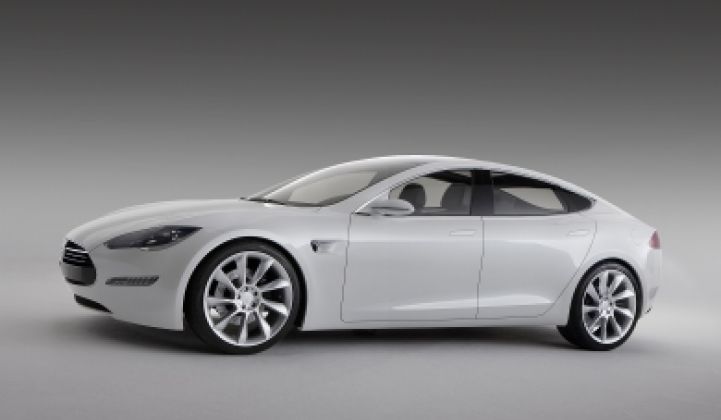Daimler announced Tuesday that it's taking a nearly 10 percent stake in Tesla Motors and planning to work more closely with the startup carmaker to develop battery and other technologies for electric cars.
The new relationship gives Tesla the much-needed partner with lots of experience in the global automotive industry, said Tesla CEO Elon Musk from a press conference at the Mercedes-Benz Museum in Stuttgart, Germany. Neither company disclosed the amount of investment, except to say that Daimler has paid a "double-digit million dollar sum" for the 10 percent stake.
Musk said Tesla could have gotten a higher per-share price from a pure investor instead of Daimler.
"The value is higher than the pure share price," Musk said. "Tesla has demonstrated an expertise on electric vehicles, but it has nowhere near the experience and capabilities of an organization like Daimler in safety, mass production and vehicle engineering."
What Daimler gets out of the relationship is to work with a plucky upstart from California. The German carmaker has been wowed by how quickly the six-year-old Tesla has been able to engineer and bring an electric car to market, said Thomas Weber, Daimler's head of research and Mercedes-Benz development. Daimler started working on electric power drives since the 1970s.
San Carlos, Calif.-based Tesla launched its first model, the sporty Roadster, in 2008. It unveiled a prototype four-door sedan, the Model S, in March this year (see Can Tesla Impress the Masses?). Tesla, which has faced financial and product delays, plans to launch the Model S in late 2011. Musk said Daimler will help with the Model S launch but didn't provide details (see Tesla Puts Musk at Helm, Expects Layoffs and Model S Delay and Cash Strapped Raises $40M, Loses Lawsuit).
"These guys are going completely unconventional ways. That's what we need in the future. To reinvent mobile is the key," Weber said at the press conference. "Tesla gained the know-how fast and efficiently thanks to its lean and powerful organization. We believe this spirit will enhance the dynamics and time-to-market of electric mobility and complement our strategy."
Daimler and Tesla reiterated their previously announced deal to work together on the Smart cars. Tesla is building lithium-ion battery packs and chargers for the first 1,000 all-electric Smart cars, though the deal could expand.
Daimler did reveal more about its plan for the Smart launch. Initial production for the Smart model is scheduled to begin by the end of the year, but mass production won't start until 2012, Weber said. Daimler will disclose the pricing for the Smart later, he added.
Both companies plan to expand its collaboration on battery technologies – from cell development to battery system management – and powertrain development, Weber said. Daimler won't announce the details of those plans until later.
The battery pack is typically the most expensive component of an electric car, so a slew of companies are developing battery technologies that would reduce the battery cost and weight while storing more energy at the same time.
Tesla is using lithium-ion battery cells provided largely by Japanese makers to build the battery packs for its Roadster. Those lithium-cobalt cells also are used in laptop computers and other consumer electronics, and are increasingly considered a less desirable type of cells for automotive applications (see In Batteries, Will Tesla Stand Alone with Cobalt?).
Lithium-cobalt cells have known to explode as a result of a "thermal runaway reaction." But the chemistry also has been around for a while and is widely available, unlike newer lithium battery chemistries that use phosphate or manganese.
Daimler executives said they picked Tesla to provide battery packs for the Smart cars because they want to launch electric cars as quickly as possible. Daimler also has been working with Tesla to ensure the safety of lithium-cobalt battery cells, Weber said.
Musk, meanwhile, noted that Tesla's expertise is in the mechanical and software engineering for battery packs, not in the development of battery cells. So Tesla could use other types of cells, including those from Li-Tec in Germany. Daimler took a 49.9 percent stake in Li-Tec, a subsidiary of Evonik Industries, last year. Daimler also created a joint venture with Evonik, called Deutsche Accumotive, in March this year to produce battery systems. Li-Tec makes nickel-cobalt-manganese cells.
Weber said Daimler will be using cells from Li-Tec for the mass production of Smart and other electric cars starting in 2012. Daimler is launching an electric Mercedes-Benz in 2010.
One of the goals for developing battery packs for future cars is to reduce the number of cells to lower the weight and cost of a battery pack, Musk said. The Roadster's battery pack has about 6,800 cells while the pack for the base model of Model S has nearly 8,000 cells.
The long-term goal is to make a battery pack with about 1,500 cells, Musk added.



